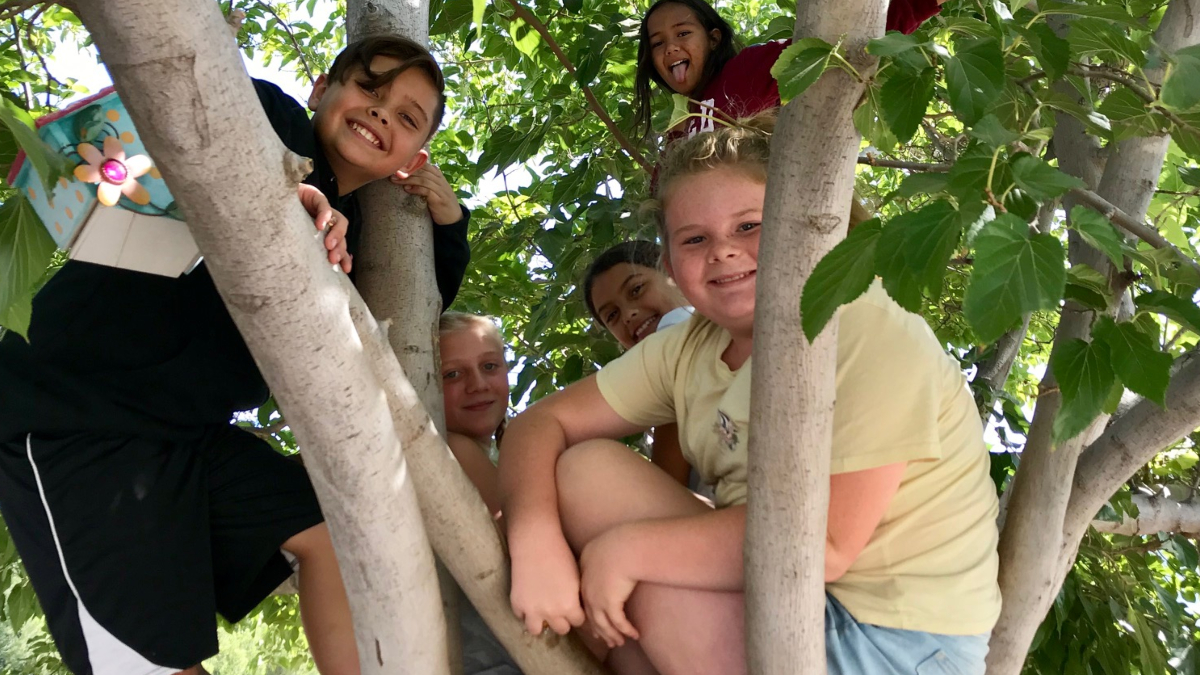Leading the Way in Two PBLs: Project-Based Learning and Play-Based Learning

By Michael Niehoff
Education Content Coordinator, iLEAD Schools
As project-based learning practitioners, some facilitators may still be in recovery from the years focused on the importance of explicit direct instruction and testing in lower grades. Indeed, there were many casualties from this era, including the unlocked learning potential of PLAY.
Researchers contend that play, or play-based learning, is a critical part of childhood learning that should not be excluded or minimized. At iLEAD, play-based learning is way more than “playing around.” Indeed, this other “PBL” is being implemented and experienced at the highest levels.
The concept of play-based learning doesn’t just feel and sound good; it has actual science behind it, according to iLEAD Agua Dulce Director Lisa Latimer.
“Play-based learning is play with intentionality,” said Latimer.
Project-based learning, by design, focuses on skill development (i.e. problem-solving and collaboration), deeper learning, inquiry, application, metacognition, student agency and creativity. Play-based learning not only complements these but actually optimizes them.
Latimer, who was recently named the USA’s Play Advocacy Committee Chair for the International Play Association, said, “Play-based learning is the best way to promote executive development in our young learners.”
The Why
Research indicates the increased complexity of language and learning processes used by children in play-based programs is linked to important literacy skills. Additionally, it has been found that children’s vocabulary and ability to develop literacy skills are higher in a play-based classroom than in a traditional classroom.
“There is a great deal of research that has concluded that play-based learning is truly impactful on student learning and development, especially in the early years of school,” said iLEAD’s Director of Humanities and Innovative Programs Dr. Angie Nastovska.
Neuroscientists have studied and concluded that play-based learning positively affects the development of specifics such as narrative language and acquisition of grammar, while also increasing their strength intellectually, physically and socially-emotionally. Indeed, they have found that play accomplished this high level of brain development that direct instruction approaches, such as rote memorization, testing, and worksheets cannot.
The facilitators at iLEAD Agua Dulce believe that children are naturally motivated to play. They have devised a play-based program that builds on this motivation, using play as a context for learning. In this context, children can explore, discover, experiment and solve problems in innovative and creative ways.
What Play-Based Learning Is Not
- It’s not just allowing students to play freely.
- It’s not just putting students in a room with a bunch of toys and letting them go.
- It’s not time where learning does not occur or where learning cannot be assessed.
- It’s not just fun time or free time, but rather a different and deeper learning than they will get from pulling out a worksheet and filling in the bubbles.
- It’s not a substitute or a hindrance for academic learning but rather the foundation. Purposeful play experiences can be constructed to create deeper learning experiences that a child will remember and internalize.
- And it’s not just lazy teaching.
What Play-Based Learning Is (Purposeful, Intentional Play)
- Agency, Autonomy, Authenticity. A play-based approach involves both child-initiated and teacher-supported learning. The teacher encourages learning and inquiry through interactions that aim to stretch thinking to higher levels. Facilitators can also use learners’ motivation and interest to explore concepts and ideas. In this way, learners acquire and practice important academic skills and learning in a playful context.
- Inquiry, Connections. For example, while children are playing with something, a facilitator can pose questions that encourage problem-solving, prediction and hypothesising. The facilitator can also bring the learner’s awareness toward mathematics, science and literacy concepts, allowing them to engage with such concepts through hands-on learning.
- Growth Mindset. Play also supports positive attitudes to learning. These include imagination, curiosity, engagement and perseverance. The type of learning processes and skills fostered in play cannot be replicated through rote learning, where there is an emphasis on remembering facts.
- Collaborative, Social-Emotional Benefits.The inquiry-based nature of play is supported through the social interactions of facilitators and learners. Facilitators take an active role in guiding learners’ interactions in the play. Learners are supported in developing social skills such as cooperation, sharing and responding to ideas, negotiating and resolving conflicts.
What It Looks Like
Whereas traditional school has often now focused on explicit direct instruction even in kindergarten or now in pre-K, Latimer emphasizes that a play-based approach is about “not telling the learners what to do or how to do it.”
“If we do the how for them,” said Latimer, “we rob them of the opportunity to discover this for themselves.” For example, she says that her facilitators at iLEAD Agua Dulce never tell learners what paint colors to mix in order to create secondary colors. “Instead, we put the primary colors out and let them discover secondary colors for themselves.”
It’s this process of self-discovery that Latimer will point to that is so vital for the learner’s brain development. Latimer explained that iLEAD Agua Dulce has created a learning environment where the facilitators routinely set up various learning labs, spaces or vignettes to accommodate. Examples include an outdoor science center, a sensory space that may have a table with various items, a storybook theatre with books and costumes, an outdoor art center complete with nontraditional art supplies and more.
For those who may continue to struggle to see the direct academic connections, Nastovska explains that play-based facilitators allow learners to discover and experience the standards, not be force-fed them. “It’s immersive, rather than prescriptive or directive,” she said.
As an example, Latimer and iLEAD Agua Dulce facilitators believe and can demonstrate that outdoor classrooms, by just simply engaging with nature, can facilitate high-level learning.
“When we tell learners to not play in the rain, we are actually doing them a disservice,” said Latimer. At iLEAD Agua Dulce, she said, “We not only let our learners play in the rain; we encourage it.”
This is about allowing learners to have authentic opportunities to learn and practice lifelong vital developmental skills, such as self-regulation and agency. “We’ve actually made our young people unhealthy — physically and emotionally — by keeping them locked up inside, protected from all the elements,” said Latimer.
This is further evidenced by iLEAD Agua Dulce’s practice of encouraging their learners to climb trees. What used to be a standard childhood activity has long given way to fear of injury.
But Latimer and iLEAD know that these play-based experiences not only develop the brain but create the foundation for deeper learning in project-based endeavors for the rest of the learner’s life. “Allowing children to play leads toward developing strong communication skills. Our learners have the opportunity to not only expend energy but to develop the tools necessary to communicate and resolve conflicts. This has created an environment where our learners solve conflicts and disputes in a positive and productive way,” said Latimer. “Our students are healthier in all aspects because of their ability to discover themselves and the world through play.”
Play, Projects, Deeper & Lifelong Learning
Sadly, research has shown that traditional, direct-instruction programs don’t support proper brain development and, worse, if applied in isolation, can have negative effects. For example, young learners who don’t get enough play often have higher levels of stress, decreased motivation and behavior problems. Research shows play-based programs for young children can provide a strong basis for later success at school. They support the development of socially competent learners, able to face challenges and create solutions.
iLEAD believes that carefully organized play helps develop such qualities in young learners as longer attention spans, perseverance, concentration and problem-solving. Play-based learning not only meets the needs of iLEAD students and their brain development but also prepares them for futures where problem-solving, creativity, innovation and ideation will drive their professional, economic, social and personal success.
iLEAD’s Play-Based Professional Learning
iLEAD has a PlayMaker Institute that is hosting an upcoming Play-Based Workshop. The institute is positioning itself to be the global leader in play-based professional learning. Plans include hosting workshops, conferences, webinars and more as part of a global, collaborative effort to promote the value and implementation of play-based learning everywhere. Indeed, much of this extends beyond school and education and is intended to be the professional vehicle for lifelong health and happiness. Finally, see iLEAD’s Being Makers for more on play-based learning and a whole lot more on project-based learning.
Resources
- International Play Association
- America’s Association for the Child’s Right to Play
- Lifelong Kindergarten at MIT
- 20 Apps That Promote Play-Based Learning from Getting Smart
- The Undeniable Power of Play: 101 Tips, Activities and Play-Based Learning Strategies to Engage Your Child
RECENT POSTS
Upcoming Events
Tues., 1/10: School resumes Mon., 1/16: School Closed in Observance of Martin Luther King Jr. Day Tues.-Fri., 1/17-20: MAP Assessments Fri., 1/20: Fall Semester ends Mon., 1/23: Spring Semester begins… Read More
Exploratory Classes at iLEAD Agua Dulce
Our Exploratory Classes are an important part of our program at iLEAD Agua Dulce. Not only are they fun and engaging, but they give our learners an opportunity to explore… Read More
iLEAD’s Reports of Progress: What They Are and Why They Matter
At iLEAD Agua Dulce, we issue a Report of Progress (ROP) for each child. An ROP might be compared to a traditional report card. However, instead of recording letter grades,… Read More



